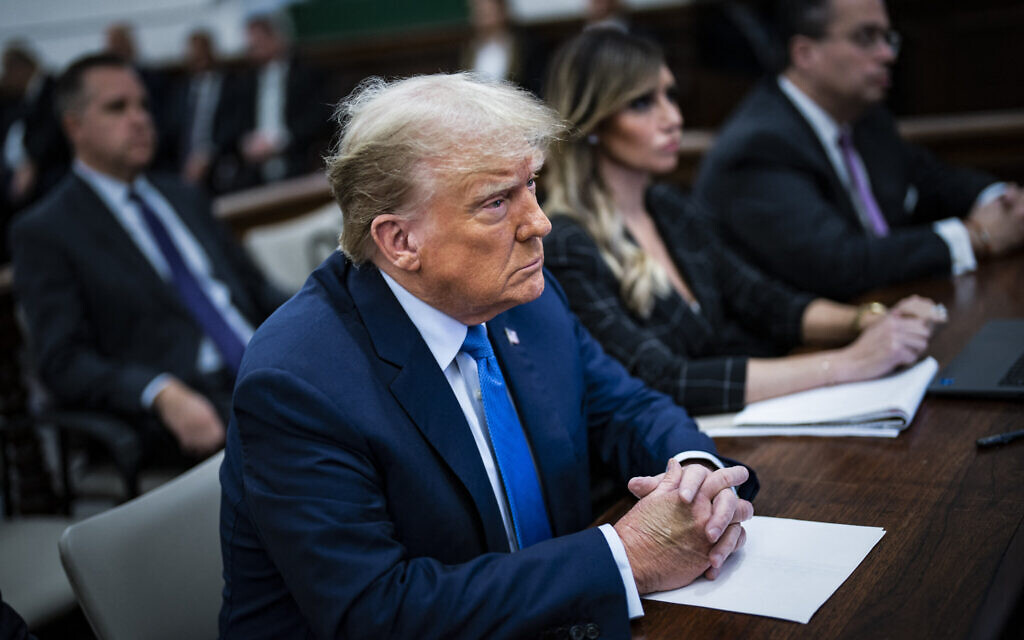Features
Donald Trump and the 2024 Jewish Vote

By HENRY SREBRNIK How did American Jews vote in the November 5, 2024 presidential election? There’s no simple answer. American Jews are a hard-to-define religious and ethnic group spread across multiple American Census categories, possessing last names from at least a dozen different languages and clustered in places that are often overwhelmingly non-Jewish. It takes a team of demographers and sociologists to determine a plausible American Jewish population figure.
So deciding who qualifies as a Jewish voter is not that easy. Must they feel a sense of belonging to the Jewish people, however defined? Or can they be “simply” Jewish, perhaps with a non-Jewish partner and children not being brought up as Jews? (After all, we have Jews by birth who are “anti-Zionists” and supporters of Palestinian efforts to destroy Israel.) That’s why figures vary widely.
American Jews number less than 2.5 per cent of the total U.S. population. To be sure, Jews vote in much greater percentages (approximately 80 per cent) than the rest of the American public (about 66 per cent). But the Jewish role in American politics goes well beyond the ballot box. In 2016, the Jerusalem Post reported on a study showing that Jews donate 50 per cent of all funding to the Democratic Party and 25 percent of all funding to the Republican Party. For the 2024 election, Forbes revealed that the top 15 donors to the Kamala Harris campaign were all people who identified as Jewish.
For about a century, American Jews, however defined, have been a reliable piece of the Democratic Party base, usually delivering two-thirds or more of their votes to the party’s presidential nominee. Over the last half century, going back to the 1968 election, Jews have favored the Democratic candidate by about 71 to 29 per cent. But in 2024, change was in the air, despite the absurd claims by some people that Donald Trump was an “antisemite.”
It turns out this proved largely baseless, according to the “2024 Jewish Vote Analysis,” a report released on November 20, 2024 by WPA Intelligence, a conservative political consultancy and analytics firm. In examining available exit polling, city and county data, and precinct data, it suggested that Trump’s strongest gains were among “those who live the most Jewish lives and reside in the most Jewish communities.”
Looking at Jewish neighbourhoods and towns, “the trends are stark and unmistakable,” WPA Intelligence stated. “Because Judaism is in some ways a communal religion and observant Judaism requires localized infrastructure, Jews who live in Jewish areas tend to be more religious and engaged. And in these neighborhoods, we see large shifts towards Trump.” Some of the most dramatic swings in the Jewish vote happened in New York. It also identified shifts in heavily Jewish areas of California, Florida, Michigan, New Jersey,and Pennsylvania. (California, New Jersey, and New York are where more than 45 per cent of American Jews live.)
“The trend is apparent from Trump’s near-unanimous support among Chassidic and Yeshivish Jews; to his rapid consolidation of the Modern Orthodox vote; to incremental gains even in more liberal Jewish areas such as Oak Park and Upper Manhattan,” the report added. “So, too, is it diverse ethnically and geographically, occurring coast to coast and overrepresenting Persian and ex-Soviet Jewish communities.”
Trump received the “overwhelming” majority of votes in New York City precincts with a Jewish population of at least 25 per cent. His 2024 performance in New York marked a substantial improvement over the 2020 and 2016 elections.
Trump also enjoyed greater success in heavily Jewish enclaves of deep-blue Democratic cities such as Chicago and Los Angeles, according to data compiled by the Chicago Board of Election Commissioners and the Los Angeles Times, respectively.
These gains have been confirmed by the Jewish website Tablet. “Who Won the Jewish Vote?” by Armin Rosen, published on November 14, 2024, includes very detailed comparisons of precinct-level numbers from the 2020 and 2024 elections. It indicated that Trump did improve his performance in a range of Jewish neighborhoods across America. “From the yeshivas of Lakewood, New Jersey, to the bagel shops of New York’s Upper West Side; from Persian Los Angeles to Venezuelan Miami; from the Detroit suburbs to the Chabadnik shchuna in Brooklyn’s Crown Heights, Jewish areas voted in higher percentages for the Republican candidate than they did in 2020.”
Nearly every neighborhood in New York with a notable density of Jewish-specific businesses and institutions, be they Hasidic, Litvish, Syrian, Russian, Bukharan, Conservative, Reform or modern Orthodox, voted heavily Republican or saw a rise in Trump’s performance.
In Brooklyn, the Midwood precincts containing Yeshiva of Flatbush voted 62 per cent for Trump. In Brighton Beach, Brooklyn’s main post-Soviet Jewish enclave, Trump’s support was consistently in the 75-90 per cent range. In Crown Heights, headquarters of the Chabad Hasidic movement, Trump got 62 per cent of the vote this time around, likely on the strength of higher turnout among Chabadniks. Back in 2016, when Trump ran against Hillary Clinton, he won 69 per cent of the vote in all of Assembly District 48, which encompasses Borough Park and Midwood (both largely Jewish communities). This year, he won 85 per cent of the vote in the district.
In the Bronx, Trump received 30 per cent of the vote in the precinct containing the Riverdale Jewish Center, and 38 per cent in the precinct with the neighborhood’s Chabad house. In Manhattan, a few of the borough’s lightest-blue Democratic precincts have the Yeshiva University campus at their center, and Trump managed to receive 37 per cent of the vote there. The Upper West Side, a traditional liberal Jewish political and cultural bastion, remained dark blue. But even there it was possible to see a shift.
Ranging a bit further afield, at least one plausible study, a poll taken by the Teach Coalition, an advocacy group founded by the Jewish Orthodox Union, found overall Jewish support for Trump in the New York suburbs at 40 per cent. Nassau County, where Jews make up close to 20 per cent of the population, saw Trump win it by five per cent, while Joe Biden took it by 10 in 2020.
The returns from other major American Jewish population centers tell a similar story, according to Tablet. Over 600,000 Jews live in New Jersey. The modern Orthodox stronghold of Teaneck gave Trump 35 per cent. In fact, he won 70 per cent of the vote in districts where most of the town’s synagogues are located. In Lakewood, where nearly every strain of Orthodox Judaism is represented, “Some of the precinct results are eye-watering,” reports Tablet. There, Kamala Harris got just 11.2 per cent. In one Lakewood precinct, District 27, Trump won all the votes, 366–0, and in another, District 36, he won 560 votes, losing only a single vote.
Trump carried Passaic County, home to a sizable Orthodox Jewish constituency. Jews make up about 25 percent of the county’s population and it has been a Democratic stronghold for decades. Biden took it with 57.5 per cent to Trump’s 41 per cent four years ago. In 2024, Trump won it with 50 per cent to Harris’s 46.5 percent. That’s a 16-point overall swing in Trump’s favor.
Voting data indicates that there was a significant shift among Jewish voters in in the crucial state of Pennsylvania. It was one of the few states without a large Orthodox Jewish population where Trump did especially well with Jewish voters. Harris did win Pennsylvania Jewish voters by seven percentage points, 48-41, according to a survey conducted by the Honan Strategy Group for the Teach Coalition. However, 53 per cent of Jewish voters said they would have pulled the lever for her had Pennsylvania governor Josh Shapiro been her running mate, while support for Trump would have dropped to 38 per cent. Jewish community leaders claimed that Shapiro was subjected to an ugly, antisemitic campaign that led to him being passed over for the slot.
The Miami area is home to over 500,000 Jews. Aventura is one of the community’s bellwethers, and Trump gained 59.7 per cent this year. An almost identical shift happened in the Miami Beach community of Surfside, where Trump took 61 per cent. Bal Harbour, another Jewish enclave, saw Trump gain 72 per cent.
In Palm Beach County, there are about 175,000 Jews out of a population of 1.5 million, or about 12 per cent. Harris won this county by 0.74 per cent, while Biden won it by 13 per cent in 2020. Trump’s vote climbed nearly seven per cent while hers dropped an equal amount off Biden’s number. Almost exactly the same type of shift happened in Broward County, where Biden got 64 per cent in 2020; the vote shifted 14 per cent toward Trump this year. Jews make up about 10 per cent of the Broward population.
In Los Angeles, where 560,000 Jews live, an article by Louis Keene, “How a Jewish Neighbourhood in Liberal Los Angeles Became a Stronghold for Trump,” published December 10 in the Forward newspaper, provides a detailed picture of the Jewish electorate. The political shift in Pico-Robertson, an Orthodox neighborhood in LA’s Westside, reflects voters “with a change of heart and changing demographics.”
Formerly majority Democratic, in 2024 for the first time, parts of Pico-Robertson turned red. Its two largest precincts swung for Trump, who received about 51 per cent of the votes compared to 44 per cent for Harris. Rabbi Elazar Muskin, who leads Young Israel of Century City, one of the oldest and largest synagogues in the neighbourhood, estimated that up to 90 per cent of his congregation voted for Trump, largely because of Israel.
As Yeshivish and Mizrahi Jews — those of Middle Eastern or North African heritage — have established a greater presence in Pico-Robertson, the area has become increasingly defined by a conservative culture and electorate. There is also a booming Persian population, as well as emergent Chabad and other Hasidic Jews.
A poll of Orthodox voters by Nishma Research in September found 93 per cent of Haredi voters supporting Trump; while data on the Persian Jewish community’s politics is harder to come by, community leaders said the numbers are similar.
Elsewhere in LA, the presence of a Chabad house or a synagogue was a reliable predictor of Trump support. For instance, Trump got 40 per cent of the vote in the North Hollywood precinct where Adat Yeshurun Valley Sephardic and Em Habanim Sephardic are located.
Los Angeles in turn mirrors the general trend in the rest of the country. Michigan is home to 116,000 Jews. West Bloomfield, centre of the Detroit-area Jewish community, went 43.7 per cent for Trump. Illinois’ 319,000 Jews live mainly in Chicago. Trump picked up votes in the Far North Side wards where Orthodox Jewish voters live, especially in the 50th Ward, where his vote increased to 46.85 per cent from 33.77 per cent in 2020.
Of course the Republican vote did not just come from the very religious. Trump also clearly gained among those most committed to Jewish identity, regardless of affiliation or observance, who were driven by concerns over left-wing antisemitism after the October 7 massacre.
Over the course of his campaign, Trump repeatedly touted his support for the Jewish state during his first term in office. While courting Jewish voters, Trump reminded Jews about his administration’s work in fostering the Abraham Accords, promising to resume the efforts to strengthen them. Trump also recognized Israel’s sovereignty over the Golan Heights, a strategic region on Israel’s northern border previously controlled by Syria, and he also moved the U.S. embassy in Israel to Jerusalem, recognizing the city as the Jewish state’s capital.
We must lay to rest the nonsense about Trump being antisemitic, lest we are to believe that the more Jewish you are, the more likely it was that you voted for an enemy of the Jewish people. Americans, including Jews, returned the arguably most pro-Israel president since the founding of the modern Jewish state to the White House.
Henry Srebrnik is a professor of political science at the University of Prince Edward Island.
Features
Are Niche and Unconventional Relationships Monopolizing the Dating World?

The question assumes a battle being waged and lost. It assumes that something fringe has crept into the center and pushed everything else aside. But the dating world has never operated as a single system with uniform rules. People have always sorted themselves according to preference, circumstance, and opportunity. What has changed is the visibility of that sorting and the tools available to execute it.
Online dating generated $10.28 billion globally in 2024. By 2033, projections put that figure at $19.33 billion. A market of that size does not serve one type of person or one type of relationship. It serves demand, and demand has always been fragmented. The apps and platforms we see now simply make that fragmentation visible in ways that provoke commentary.
Relationship Preferences
Niche dating platforms now account for nearly 30 percent of the online dating market, and projections suggest they could hold 42 percent of market share by 2028. This growth reflects how people are sorting themselves into categories that fit their actual lives.

Some want a sugar relationship, others seek partners within specific religious or cultural groups, and still others look for connections based on hobbies or lifestyle choices. The old model of casting a wide net has given way to something more targeted.
A YouGov poll found 55 percent of Americans prefer complete monogamy, while 34 percent describe their ideal relationship as something other than monogamous. About 21 percent of unmarried Americans have tried consensual non-monogamy at some point. These numbers do not suggest a takeover. They suggest a population with varied preferences now has platforms that accommodate those preferences openly rather than forcing everyone into the same structure.
The Numbers Tell a Different Story
Polyamory and consensual non-monogamy receive substantial attention in media coverage and on social platforms. The actual practice rate sits between 4% and 5% of the American population. That figure has remained relatively stable even as public awareness has increased. Being aware of something and participating in it are separate behaviors.
A 2020 YouGov poll reported that 43% of millennials describe their ideal relationship as non-monogamous. Ideals and actions do not always align. People answer surveys about what sounds appealing in theory. They then make decisions based on their specific circumstances, available partners, and emotional capacity. The gap between stated preference and lived reality is substantial.
Where Young People Are Looking
Gen Z accounts for more than 50% of Hinge users. According to a 2025 survey by The Knot, over 50% of engaged couples met through dating apps. These platforms have become primary infrastructure for forming relationships. They are not replacing traditional dating; they are the context in which traditional dating now occurs.
Younger users encounter more relationship styles on these platforms because the platforms allow for it. Someone seeking a conventional monogamous partnership will still find that option readily available. The presence of other options does not eliminate this possibility. It adds to the menu.
Monopoly Implies Exclusion
The framing of the original question suggests that niche relationships might be crowding out mainstream ones. Monopoly means one entity controls a market to the exclusion of competitors. Nothing in the current data supports that characterization.
Mainstream dating apps serve millions of users seeking conventional relationships. These apps have added features to accommodate other preferences, but their core user base remains people looking for monogamous partnerships. The addition of new categories does not subtract from existing ones. Someone filtering for a specific religion or hobby does not prevent another person from using the same platform without those filters.
What Actually Changed
Two things happened. First, apps built segmentation into their business models because segmentation increases user satisfaction. People find what they want faster when they can specify their preferences. Second, social acceptance expanded for certain relationship types that previously operated in private or faced stigma.
Neither of these developments amounts to a monopoly. They amount to market differentiation and cultural acknowledgment. A person seeking a sugar arrangement and a person seeking marriage can both use apps built for their respective purposes. They are not competing for the same resources.
The Perception Problem
Media coverage tends toward novelty. A story about millions of people using apps to find conventional relationships does not generate engagement. A story about unconventional relationship types generates clicks, comments, and shares. This creates a perception gap between how often something is discussed and how often it actually occurs.
The 4% to 5% practicing polyamory receive disproportionate coverage relative to the 55% who prefer complete monogamy. The coverage is not wrong, but it creates an impression of prevalence that exceeds reality.
Where This Leaves Us
Niche relationships are not monopolizing dating. They are becoming more visible and more accommodated by platforms that benefit from serving specific needs. The majority of people seeking relationships still want conventional arrangements, and they still find them through the same channels.
The dating world is larger than it was before. It contains more explicit options. It allows people to state preferences that once required inference or luck. None of this constitutes a takeover. It constitutes an expansion. The space for one type of relationship did not shrink to make room for another. The total space grew.
Features
Matthew Lazar doing his part to help keep Israelis safe in a time of war

By MYRON LOVE It is well known – or at least it should be – that while Israel puts a high value of protecting the lives of its citizens, the Jewish state’s Islamic enemies celebrate death. The single most glaring difference between the opposing sides can be seen in the differing approach to building bomb shelters to protect their populations.
Whereas Hamas and Hezbollah have invested untold billions of dollars over the past 20 years in building underground tunnels to protect their fighters while leaving their “civilian” populations exposed to Israeli bombs, not only has Israel built a highly sophisticated anti-missile system but also the leadership has invested heavily in making sure that most Israelis have access to bomb shelters – wherever they are – in war time.
While Israel’s bomb shelter program is comprehensive, there are still gaps – gaps which Dr. Matthew Lazar is doing his bit to help reduce.
The Winnipeg born-and raised pediatrician -who is most likely best known to readers as a former mohel – is the president of Project Life Initiatives – the Canadian branch of Israel-based Operation Lifeshield whose mission is to provide bomb shelters for threatened Israeli communities.
Lazar actually got in on the ground floor – so to speak. It was a cousin of his, Rabbi Shmuel Bowman, Operation Lifeshield’s executive director, who – in 2006 – founded the organization.
“Shmuel was one of a small group of American olim and Israelis who were visiting the Galilee during the second Lebanon war in 2006 and found themselves under rocket attack – along with thousands of others – with no place to go,” recounts Lazar, who has two daughters living in Israel. “They decided to take action. I was one of the people Shmuel approached to become an Operation Lifeshield volunteer.
Since the founding of Lifeshield, Lazar reports, over 1,000 shelters have been deployed in Israel. The number of new shelter orders since October 7, 2023 is 149.
He further notes that while the largest share of Operation Lifeshield’s funding comes from American donors, there has been good support for the organization across Canada as well.
One of the major donors in Winnipeg is the Christian Zionist organization, Christian Friends of Israel (FOI) Canada which, in September, as part of its second annual “Stand With Israel Support” evening – presented Lazar and Operation Lifeshield with a cheque for $30,000 toward construction of a bomb shelter for the Yasmin kindergarten in the Binyamina Regional Council in Northern Israel.
Lazar reports that to date the total number of shelters donated by Friends of Israel Gospel Ministry (globally) is over 100.
Lazar notes that the head office for Project Life Initiatives is – not surprisingly – in Toronto. “We communicate by telephone, text and Zoom,” he says.
He observes that – as he is still a full time pediatrician – he isn’t able to visit Israel nearly as often as he would like to. He manages to go every couple of years and always makes a point of visiting some of Operation Lifeshield’s projects.
(He adds that his wife, Nola, gets to Israel two or three times a year – not only to visit family, but also in her role as president of Mercaz Canada – the Canadian Conservative movement’s Zionist arm.)
“This is something I have been able to do to help safeguard Israelis,” Lazar says of his work for Operation Lifeshield. “This is a wonderful thing we are doing. I am glad to be of help. ”
Features
Patterns of Erasure: Genocide in Nazi Europe and Canada

By LIRON FYNE When we think of the word genocide, our minds often jump to the Holocaust, the mass-scale, systemic government-led murder of six million Jews by Nazi Germany during the Second World War, whose unprecedented scale and methods led to the very term ‘genocide’ being coined. On January 27th, 2026, we will bow our heads for International Holocaust Remembrance Day, the 80th year of remembrance.
Less frequently do we connect genocidal intent to the campaign against Indigenous peoples in Canada; the forced displacement, cultural destruction, and systematic killing that sought to erase Indigenous peoples. The genocide conducted by the Nazis and the genocidal intent of the Canadian government, though each unique in scale, motive, and implementation, share many conceptual similarities. Both were driven by ideologies of racial superiority, executed through governmental precision, and justified by the perpetrators as a moral mission.
At their core rests the concept of dehumanization. In Nazi Germany, Jews were viewed as subhuman, contaminated, and a threat to the ‘Aryan’ race. In Canada, Indigenous peoples were represented as obstacles to ‘progress’ and seen as hurdles to a Christian, Eurocentric nation. These ideas, this dehumanization, turned human beings into problems to be solved. Adolf Hitler called it the ‘Jewish question,’ leading to an official policy in 1942 called the ‘Final Solution to the Jewish Question,’ whereas Canadian officials called it the ‘Indian problem.’ The language is similar, a belief that one group’s existence endangers the destiny of another. The methods of extermination differed in practice and outcome, but the language of intent resembles one another.
The Holocaust’s concentration camps and carefully engineered gas chambers were designed for efficient, industrial-scale killing, resulting in mass murder. The well-organized plan of systematic degradation, deadly riots, brutal camp conditions, and designated killing centres were only a few of the ways the Nazis worked to eliminate the Jews. The Canadian government’s weapons were policy, assimilation and abandonment. Such as the Indian Act, reserves, and residential schools, which were all meant to ‘kill the Indian in the child,’ cutting generations off from their languages, families, and cultures. Thousands of Indigenous children died in residential schools, buried in unmarked graves near schools that called themselves places of learning. Both systems were backed by either religion or ideology; Nazi ideology brought together racist eugenic policies and virulent antisemitism, while Canada’s genocidal intent was supported by Christian Protestantism claiming to save Indigenous souls by erasing their heritage.
The Holocaust was a six-year campaign of complete industrialized extermination, mass murder with a mechanized intent, on a scale that remains historically unique. The Truth and Reconciliation Commission describes Canada’s indigenous genocide as a cultural one that unfolded over centuries through assimilation and the destruction of indigenous languages and identities. The Holocaust ended with the liberation of the camps and a global recognition of the atrocities committed. However, the generational trauma and dehumanization of antisemitism carry on. For Indigenous peoples in Canada, the effects of the genocidal intent continue to this day, visible in displacement, poverty, and intergenerational trauma. While these histories differ in form and timeline, both are rooted in dehumanization and the belief that some lives are worth less than others.
A disturbing similarity lies in the aftermath: silence and denial. The Holocaust forced the world to confront the atrocity with the vow of ‘Never Again,’ which has now been unearthed and reformed as ‘Never Again is Now,’ after the October 7th, 2023, massacre by Hamas. The largest massacre of Jewish people since the Holocaust, and the denial of the atrocities committed on October 7th, highlight the same Holocaust denial we see rising around the world. In Canada, for decades, the genocidal intent was hidden behind narratives of kindness and social progress. Only in recent years, through survivor testimony for the Truth and Reconciliation Commission, and the discovery of unmarked graves, has the truth gained recognition. But acknowledgment without justice risks repeating the same patterns of erasure.
Comparing these atrocities committed is not about comparing pain or scale; it is about understanding the shared systems that enabled them. Both demonstrate how racism, superiority, and dehumanization can be used to justify the destruction of human beings. Remembering is not enough in Canada. True remembrance demands accountability, land restitution, reparations, and education that confronts Canada’s ongoing colonial legacy. When we say ‘Never Again is Now’, we hold collective action to combat antisemitism in all forms. The same applies to Truth & Reconciliation; it must be more than a slogan; we must apply action to Truth & ReconciliACTION.
Liron Fyne is a 12th-grade student at Gray Academy of Jewish Education in Winnipeg. They are currently a Kenneth Leventhal High School Intern at StandWithUs Canada, a non-profit education organization that combats antisemitism.




